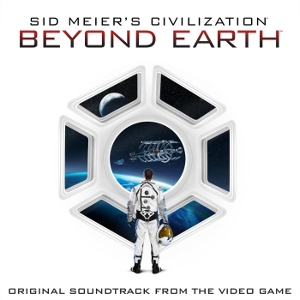Civilization -Beyond Earth- Original Soundtrack
 |
Album Title: Civilization -Beyond Earth- Original Soundtrack |
| Record Label: 2K Games |
|
| Catalog No.: N/A |
|
| Release Date: October 24, 2014 |
|
| Purchase: Buy at Amazon |
Overview
The autumn of 2014 certainly seems to have been a time for space travel in the entertainment industry. Interstellar’s release in theaters has sparked physics and astronomy conversations worldwide, Destiny made a splash with its mixed-media MMO/FPS-style gameplay, and Civilization: Beyond Earth — a game I actually saw advertised during trailers of Interstellar — takes the long-running series beyond Earth, so to speak, and out into the cosmos. The game itself is the first in its series to diverge from its trademark historical perspective, instead taking place far into the future, and sprawling across multiple planets. The game has been met with marked success; reviewers have commented particularly on the technical aspects of gameplay and the lush visuals. The soundtrack has undoubtedly been a part of Civilization’s success, reaching almost three hours in length and featuring a full orchestra, choir, and delicate electronics.
Body
The score was divided up among four composers: Geoff Knorr, Griffin Cohen, Michael Curran, and Grant Kirkhope. Each piece is listed as being written by a specific composer; it did not take much listening to understand that these composers, while all musically skilled, are vastly different writers. Consequently, the soundtrack comprises of four distinct sounds, for better or worse. The score is a seriously impressive one: vast, epic, and beautifully executed. Additionally, the transitions between tracks are often seamless. However, each composer plays a certain role in writing for Civilization, and division of roles is evident upon listening to the score.
Geoff Knorr was the lead composer and orchestrator of Civilization: Beyond Earth, composing the majority of the score. Knorr, who has also scored for previous Civilization games including the fifth installment in the main series, heavily utilizes solo strings to bring a vibrant, earthy tone to the score. “The Seeding,” the opening track to Civilization, begins with low, pulsing electronics that quickly ascend into a sweeping string melody, later subduing to let a rich solo cello take over and complete the piece, accompanied by a stately chorus. Knorr’s pieces are filled with these types of soaring patterns.
It wasn’t until I saw the first few images of Civilization that I understood how the score could fit with this type of game. Until then, I wondered how such an incredibly massive and ambitious score functioned as a soundtrack 4X-strategy game like Civilization (even a really good one). “Beyond Earth,” Knorr’s second track (and the second track of the album) is a gentler piece consisting of lengthy, dissonant harmonies, changing one note at a time and once again combining strings and electronics for an appropriately otherworldly sound. “The Lush Planet” and later “Lux Perpetua” incorporate a theme that bears a striking resemblance to Ralph Vaughn Williams’ “Variations on a Theme by Thomas Tallis” — the pieces majestically introduce one of the verdant planets of the game.
Most of these cinematic pieces play during Civilization’s many impressive cutscenes. For the time spent strategizing on each planet, however, Geoff Knorr stepped back and composer Griffen Cohen moved in, creating a series of ambient pieces for the strategy portions of the game. The music works well within context, though prove relatively low-key additions to the stand-alone album. Each planet gets a “Early” “Middle” and “Late” ambient theme, and as time passes during the mechanics of Civilization. “The Lush Planet (Ambient Middle)” is one such piece, with varying tones and timbres shifting as the piece continues, often giving way to more industrial sounds. The “Late” ambient themes tend to have slightly more symphonic texture than the earlier tracks. “Planetfall (Ambient Late 2)” has something of a rhythm to it, with very soft electronics gently pulsing their way through the piece. It also includes chord changes and hints of a melody as it continues. “The Arid Planet (Ambient Late)” includes string glissandos, both soprano and bass, and a horn, vaguely emulating a soundtrack to a Western film.
It is also upon visiting the musical world of the Arid Planet during which the soundtrack introduces Michael Curran, the third composer of Civilization: Beyond Earth, and former lead composer of Civilization V. “The Arid Planet” begins with a somber and stately melody featuring soft horns and strings playing in unison. Curran’s entrance to the score is a good one; while his compositional style meshes well with that of Knorr in terms of instrumentation and texturing, he tends to stretch out a single melody for much longer — taking a thirty second melody into something stretch several minutes by treating them like an ostinato with the occasional variations, repeating the melody in several different settings. Indeed, “The Arid Planet” essentially plays the same melody for two and a half minutes, and yet the piece works. “Planetfall” is another such piece, although the melody is repeated far less, instead giving way to the whole notes and breves of Knorr’s less eventful works. The melody is a substantial one, however, bringing the solo horn back in to play a thoughtful, triumphant melody, and ending with waves of strings washing the horn away.
“O Muse” is one of Curran’s magnum opii in the score, as well as one of the best pieces out of all of the composers in the score. The piece begins slowly and ominously, using low strings and full choir to establish a rhythm and direction, but builds up slowly to eventually feature a full choir in a vastly magnificent melody essentially consisting of two notes. “Deep Space” consists of a gorgeous melody on rich strings, brass, and a solo violin, simultaneously dark and bright, rich and imposing. Not all of Curran’s works are so large, however; “Sky Mine” could conceivably be one of Cohen’s ambient pieces, although with a little more orchestra.
Finally, Grant Kirkhope, while scoring relatively little of the soundtrack, demonstrated an impressive versatility, and I found myself consistently enjoying his contributions. Kirkhope, perhaps best known for his work in the Banjo Kazooie games, contributes a series of tracks that build and develop wonderfully, and utilize musical forms that evidence Kirkhope’s experience in the video game music industry. “Dogmatic Engineering” underscores a bright, playful string pattern underneath some baritone and alto brass, giving the score a texture that simply did not exist previously, while “Solar Collector” showcases Kirkhope’s theatricality and structural abilities with a beautifully developed oboe melody, carefully cultivated though the use of delicate strings and brass as the piece progresses. Eventually, the brass and strings overshadow the oboe as the piece culminates into a march-like pattern.
One of my favorite tracks, “Xeno Titan,” rises and swells like any cinematic battle theme, complete with full choir and rapidly pulsing strings in one of the most rhythmic pieces of the score. By the end, Kirkhope has orchestrated a wild string soli section that spans the entire range of the violin in the space of about thirty seconds. The break from grandeur, tranquility, and massiveness is refreshing and exciting, making Kirkhope the most successful composer on what is already a pretty successful score. A ghost of the melody returns in “The Signal,” this time with a return of Kirkhope’s oboe. Kirkhope has already demonstrated his above average capacity for developing melody lines across textures and meters, but there was not a single point where I felt as though one piece was too similar to another to spend the time on an analysis; Kirkhope’s work alone in this score could have carried most game scores without any external contributions, although that’s not to say that the combination of composers in this score failed.
Summary
All in all, the score to Civilization: Beyond Earth is a solid one, boasting versatility from its four composers and a sense of grandeur that isn’t often present in strategy games. While Knorr and Curran contributed the subdued, slower, and soaring pieces (Knorr both opening and closing the score), and Cohen took over for the most of the deep-thinking strategy portions, Kirkhope’s work was some of the most fun game music I have heard all year. He consequently adds significantly to the score that would otherwise been powerful, but perhaps lacking movement or substance. This is easily a must-have score for those who are attracted to sweeping epics, both in games and in film, and I am looking forward to the next soundtrack in the series.
Do you agree with the review and score? Let us know in the comments below!
4
Posted on November 22, 2014 by Emily McMillan. Last modified on November 21, 2014.















░░░░░░░░░░░░▄▄░░░░░░░░░
░░░░░░░░░░░█░░█░░░░░░░░
░░░░░░░░░░░█░░█░░░░░░░░
░░░░░░░░░░█░░░█░░░░░░░░
░░░░░░░░░█░░░░█░░░░░░░░
███████▄▄█░░░░░██████▄░░
▓▓▓▓▓▓█░░░░░░░░░░░░░░█░
▓▓▓▓▓▓█░░░░░░░░░░░░░░█░
▓▓▓▓▓▓█░░░░░░░░░░░░░░█░
▓▓▓▓▓▓█░░░░░░░░░░░░░░█░
▓▓▓▓▓▓█░░░░░░░░░░░░░░█░
▓▓▓▓▓▓█████░░░░░░░░░█░░
██████▀░░░░▀▀██████▀░░░░